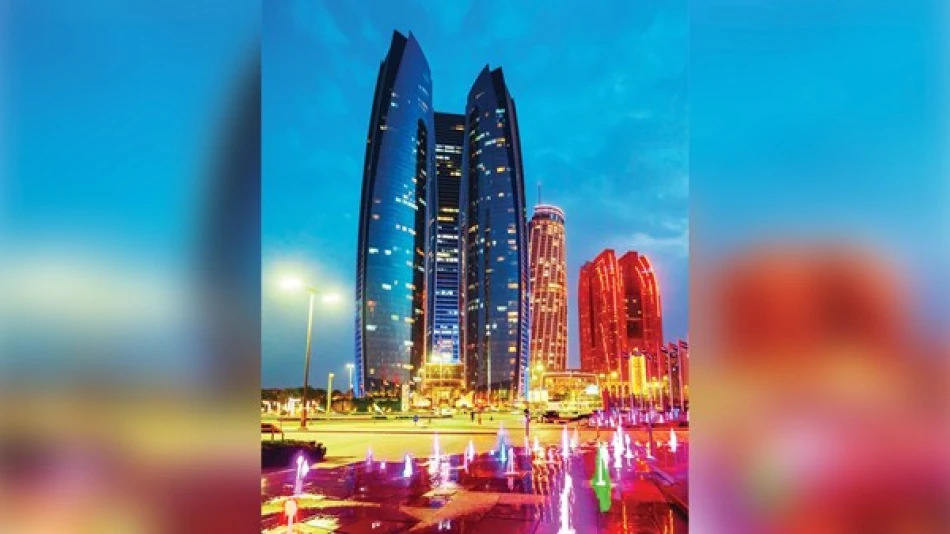
UAE Tops Global FDI Performance Index 2025: Unlocking Opportunities for Investors
UAE Defends Global FDI Crown as Regional Rivals Struggle to Match Investment Magnetism
The United Arab Emirates has secured the top global ranking for foreign direct investment performance for the second consecutive year, attracting investment flows 14 times larger than what its economy size would typically warrant. This exceptional performance comes as global FDI flows declined 11% for the second straight year, highlighting the Emirates' unique ability to draw international capital in an increasingly challenging investment landscape.
The Numbers Behind UAE's Investment Dominance
According to FDI Intelligence's latest Global FDI Performance Index, the UAE ranked first among 105 countries when measuring FDI attraction relative to economic size. The country also claimed the second position globally for total FDI project numbers, securing 1,359 new projects in 2024—trailing only the United States with 2,460 projects but significantly outpacing the UK (1,193), India (1,080), and Germany (887).
The UAE's FDI inflows reached a historic high of AED 167.3 billion ($45.6 billion) in 2024, representing a remarkable 48.7% increase from the previous year's AED 112.7 billion. This surge occurred against a backdrop of declining global investment appetite, making the achievement even more significant.
Strategic Sectors Driving Growth
Technology and AI Taking Center Stage
Business services, technology, and financial services continue to dominate UAE's FDI landscape, with financial services experiencing particularly robust project growth in 2024. The country's AI Strategy 2031 and UAE Centennial 2071 strategy are proving effective in attracting tech giants, evidenced by Microsoft's decision to establish a new global hub in Abu Dhabi and its subsequent partnership with G42 for sovereign AI cloud infrastructure.
Transportation, storage, telecommunications, and consumer products sectors also recorded notable increases, while artificial intelligence, cybersecurity, and cloud computing emerged as primary investment drivers.
Beyond Oil: The Diversification Success Story
The UAE's investment success reflects a broader economic transformation away from hydrocarbon dependence. Multiple free zones across Abu Dhabi, Dubai, Ras Al Khaimah, and Sharjah have created specialized ecosystems that cater to different industries, from technology and finance to logistics and manufacturing.
What Sets UAE Apart in the Regional Competition
While regional competitors like Saudi Arabia focus heavily on mega-projects and Qatar prepares for post-World Cup economic strategies, the UAE has built its advantage on several unique factors. Its non-aligned foreign policy keeps doors open to investors from both East and West—a crucial advantage in an increasingly polarized global economy.
The country's Golden Visa and Green Visa programs have created clear pathways for talent attraction, while its legal framework provides security that many emerging markets struggle to match. Most importantly, the UAE's political stability in a volatile region continues to be a decisive factor for risk-conscious international investors.
Market Implications and Future Outlook
Ambitious Targets Ahead
The UAE's National Investment Strategy 2031 sets bold targets: doubling cumulative FDI between 2025-2031 to reach 30% of total national investments (currently 15%), and achieving AED 1.3 trillion in total investment flows. The strategy also aims to triple cumulative foreign direct investment stock to AED 2.2 trillion by 2031.
These targets, while ambitious, appear achievable given current momentum. The UAE's ability to attract investment during a global downturn suggests strong fundamentals that should support continued growth even as international competition intensifies.
Global Investment Landscape Shifts
The UAE's success contrasts sharply with global trends. While traditional FDI powerhouses face economic headwinds and geopolitical complications, smaller, agile economies with clear value propositions are capturing disproportionate investment flows. This trend mirrors Singapore's historical success in Southeast Asia and positions the UAE as the Gulf's undisputed investment hub.
For investors and multinational corporations, the UAE's performance indicates a maturing ecosystem capable of supporting complex, high-value operations. The concentration of AI and technology investments particularly signals the country's evolution from a regional trading hub to a global innovation center.
The sustainability of this growth will depend on the UAE's ability to maintain its political neutrality, continue regulatory reforms, and develop the human capital necessary to support increasingly sophisticated industries. Current indicators suggest the country is well-positioned to meet these challenges.
Most Viewed News

 Layla Al Mansoori
Layla Al Mansoori






